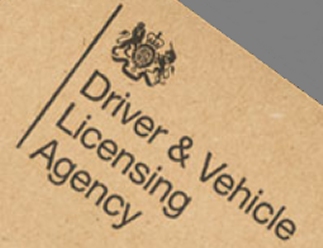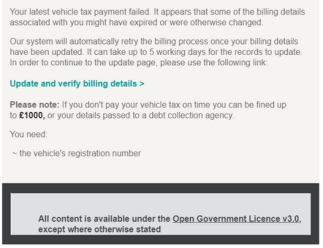|
Which? magazine has revealed several DVLA scams over recent
months but the latest is one we need to be aware of. The Which?
reporter says "when I received my vehicle tax renewal
in the post a while back, like most people these days, I opted
to pay it online. Everything went through as normal, but just
two days later, an email appeared in my inbox that made me
look twice". It was headed "Your latest vehicle
tax payment failed" with the message reproduced above
right which mentioned a risk of a £1,000 fine and offering
a convenient link to "Update and verify billings details"
- in other words give us your bank account details so we can
rob you! The Which? reporter added "even though my
email account flagged the message as spam, the professionally
worded subject title, along with the presence of the ‘customer
number’ made me open things up for a closer look".
Fortunately he checked the email address it came from and
that "acted as a dead giveaway, but the email arriving
so close to my legitimate online renewal does beg the question;
had my data been leaked somewhere? How did the scammers know?"
A Which? consumer rights expert mentioned "the DVLA assured
us its systems are secure, built to Government standards and
checked regularly for any vulnerabilities. It is, however,
good practice to regularly clear your browsing data, keep
your browser up-to-date, ensure you’ve got a good antivirus
software and have good password hygiene. Scammers are becoming
increasingly conniving, so trust your spam filters and
pause to think if you’re being asked to input payment
details after following a hyperlink to another website. It
can’t be ruled out that this case in particular could
have been a coincidence – it’s not uncommon for
scammers to chance their arm with multiple emails at different
times. With clever DVLA scams targeting drivers regularly,
Which? magazine has written a new guide on how to spot them,
so you can stay ahead of the fraudsters".
Basic checks on emails which suggest mischief
> Check the "from" email address looks
valid - often it will be seen as wrong but some are clever.
> Check if any linked website is legitimate - take
care as some scambugs create clever domain names.
> Check if they ask or seek personal and bank details -
if they do delete the email promptly.
> Check for poor spelling, grammar or style - often scambugs'
style is a giveaway.
|




